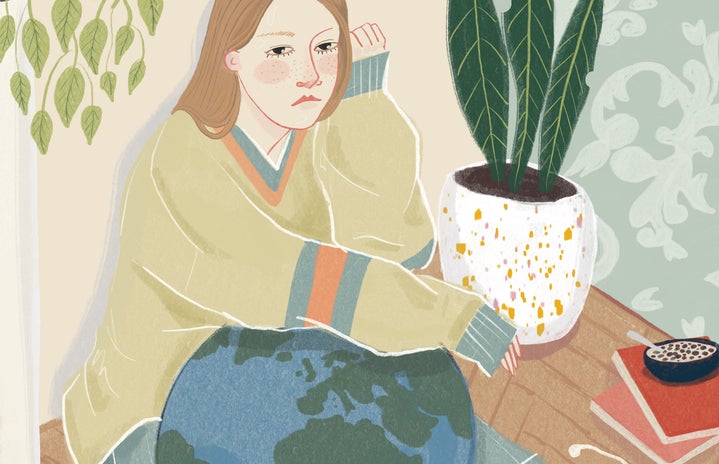Do you ever feel anxious when seeing news related to the climate crisis? Maybe it made you change the channel, close a tab, look for some distraction. This characteristic of discomfort, anxiety, palpitation when feeling waiting for an imminent danger, or unable to change a situation, is very common in cases of eco-anxiety and solastalgia.
Climate change is a reality and threatens the Earth’s future. This circumstance can have psychological impacts on some people. “All the environmental problems, climate change, poor nutritional quality of food, impacts of pesticides and its relationship with cancer and other diseases, species extinction are examples that show the ecosystem is interconnected as a whole. We know that, but sometimes we choose to get over it and continue personal and work activities, as if none of these problems were knocking on our door”, says the ecofeminist Vanessa Lemgruber, author of the book “Guia Ecofeminista: Mulheres, Direito, Ecologia” (Ecofeminist Guide: Women, Rights, Ecology).
“But some start to think that it seems that we cannot do anything to change these problems, that individually there is nothing we can do. And honestly, I also think that individually you can’t do anything. But these are the people who can get extremely worried”, continues.
Eco-anxiety
Although worry and anxiety about the environmental crisis can seem normal, eco-anxiety is a more intense state, due to the seriousness of the problems we are facing. The Ph.D. in Clinical Psychology, *Mariana Pelizer, it’s engaged in the strength of the Amazon Forest, on the one hand, and its exploration, on the other, provoked in her body, and explains more the eco-anxiety effects:
“People more sensitive to environmental issues who cannot develop a more positive and strategic way of living (changing the way they eat, consume, live), or who understand climate change in an apocalyptic way (the proximity of the end of the world), have a greater tendency to feel the symptoms of anxiety, which in this case presents itself as a chronic fear about the future of oneself and of the next generations”.
Mariana Pelizer
Pelizer points out that the main symptoms are excessive preoccupation with the future, fear of experiencing major ecological disasters or having to deal extremely with the consequences of climate change. “In addition, all the classic symptoms of anxiety attacks or generalized anxiety can be present, such as shortness of breath, insomnia, palpitations and excessive worry”.
In an article elaborated by the British Medical Journal, medical professionals Mala Rao and Richard Powell, from the department of primary care and public health at Imperial College London, claim that young people between 16 and 25 years old fear the future and believe that humanity “is doomed” such as the rise in ecological anxiety levels has been underestimated, harming the well-being of many in the long term.
In their perspectives, government entities fail to respond adequately to environmental issues, leaving new generations “without a future” and “condemning humanity”. According to another study, published by the University of Bath, a widespread of high levels of psychological distress “will negatively affect the mental health” of young people in the future”. The researchers who participated in the study, continued that government starvation in relation to climate change causes psychological damage that can be considered a violation of international human rights.
Solastalgia
A coined word to describe ‘when the notion of our place in the world is violated. The word solastalgia may not have entered the dictionary, but it doesn’t mean it doesn’t deserve attention. Although it is not considered a disease, like eco-anxiety, it’s defined by a set of psychological disorders that occur with groups that see their territories affected by extreme actions, whether human or climatic activities.
“Eco-anxiety manifests itself in the excessive concern or fear of an environmental disaster, as solastalgia is a feeling associated with the environmental change that has already happened”, explains Mariana Pelizer. “Indigenous have dealt with solastalgia since colonization. Regarding recent Brazil, we can mention the environmental crimes of Brumadinho and Mariana and their consequences. Many people are dealing with the destruction caused by the mud and suffering emotionally from the alteration of the place where they live there”, states Mariana Pelizer. It is worth remembering that both cases were due to mistakes caused by multinationals.
Another example that explains the solastalgia impact is the Hurricane Katrina case. According to a 2018 MIT (Massachusetts Institute of Technology) article, survivors of Hurricane Katrina, which hit the east coast of the United States in 2005, are 4% more likely to suffer from mental illness, in addition to post-traumatic stress disorder.
“We feel a connection with the land – a territory where we grew up – because the environment also can shape us. Our social interactions also shape us, so when there is a very large physical, environmental change, where ecosystems are degraded, the climate is altered, we feel a certain nostalgia, not only a longing but an almost sadness.”
Vanessa Lemgruber
Perspectives to the future
According to the United Nations (UN), by 2030, carbon dioxide emissions are expected to increase by 16%, instead of falling by half, as provided previously by the Paris Agreement to limit global warming. For the specialists Rao and Powell, global leaders need to “recognize the challenges ahead, the need to act now and the commitment needed to create a path towards a happy and healthy future, leaving no one behind”.
One of the solutions pointed out by them is the provision of information for taking action. “The best chance to increase the optimism and hope of young and old anxious for the environment is to ensure that they have access to the best and most reliable information on mitigation and adaptation to the climate”, they comment. The researchers stress the importance of how providing information to these groups can make them connect more strongly with nature, contribute to greener choices at the individual level, and join forces with like-minded people.
Vanessa Lemgruber also gives others tips that can be an answer to all these problems: “We can observe national and international examples who give us indications of what to do: Sonia Guadajajara, Chico Mendes, Dorothy Stang, Margarida Alves. They show us mostly examples of reforestation and how the work associated with environmental education with communities can be effectively transforming”. And Mariana Pelizer emphasizes the fact that the person who thinks it’s suffering from the eco-anxiety should search for professional help:
“Each person has a very specific way of dealing with the malaise, so when a person goes through situations of extreme suffering that impair their quality of life and the conduct of their routine, they need to seek specialized help”.
*Mariana Pelizer is also a Clinical Psychologist with experience in institutional analysis, schizoanalysis, schizodrama and therapeutic follow-up. Ecofeminist. Studies at Esquizobody populated by the Cerrado and Amazonia.
Like this type of article? Check Her Campus Casper Libero for more.


